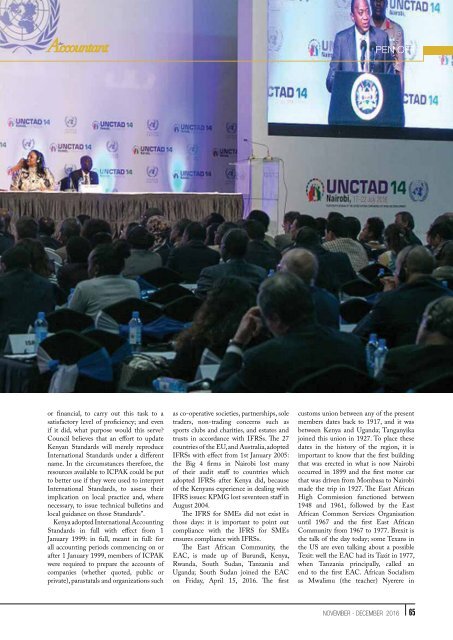The Accountant Nov-Dec 2016
You also want an ePaper? Increase the reach of your titles
YUMPU automatically turns print PDFs into web optimized ePapers that Google loves.
PEN OFF<br />
or financial, to carry out this task to a<br />
satisfactory level of proficiency; and even<br />
if it did, what purpose would this serve?<br />
Council believes that an effort to update<br />
Kenyan Standards will merely reproduce<br />
International Standards under a different<br />
name. In the circumstances therefore, the<br />
resources available to ICPAK could be put<br />
to better use if they were used to interpret<br />
International Standards, to assess their<br />
implication on local practice and, where<br />
necessary, to issue technical bulletins and<br />
local guidance on those Standards”.<br />
Kenya adopted International Accounting<br />
Standards in full with effect from 1<br />
January 1999: in full, meant in full: for<br />
all accounting periods commencing on or<br />
after 1 January 1999, members of ICPAK<br />
were required to prepare the accounts of<br />
companies (whether quoted, public or<br />
private), parastatals and organizations such<br />
as co-operative societies, partnerships, sole<br />
traders, non-trading concerns such as<br />
sports clubs and charities, and estates and<br />
trusts in accordance with IFRSs. <strong>The</strong> 27<br />
countries of the EU, and Australia, adopted<br />
IFRSs with effect from 1st January 2005:<br />
the Big 4 firms in Nairobi lost many<br />
of their audit staff to countries which<br />
adopted IFRSs after Kenya did, because<br />
of the Kenyans experience in dealing with<br />
IFRS issues: KPMG lost seventeen staff in<br />
August 2004.<br />
<strong>The</strong> IFRS for SMEs did not exist in<br />
those days: it is important to point out<br />
compliance with the IFRS for SMEs<br />
ensures compliance with IFRSs.<br />
<strong>The</strong> East African Community, the<br />
EAC, is made up of Burundi, Kenya,<br />
Rwanda, South Sudan, Tanzania and<br />
Uganda; South Sudan joined the EAC<br />
on Friday, April 15, <strong>2016</strong>. <strong>The</strong> first<br />
customs union between any of the present<br />
members dates back to 1917, and it was<br />
between Kenya and Uganda; Tanganyika<br />
joined this union in 1927. To place these<br />
dates in the history of the region, it is<br />
important to know that the first building<br />
that was erected in what is now Nairobi<br />
occurred in 1899 and the first motor car<br />
that was driven from Mombasa to Nairobi<br />
made the trip in 1927. <strong>The</strong> East African<br />
High Commission functioned between<br />
1948 and 1961, followed by the East<br />
African Common Services Organisation<br />
until 1967 and the first East African<br />
Community from 1967 to 1977. Brexit is<br />
the talk of the day today; some Texans in<br />
the US are even talking about a possible<br />
Texit: well the EAC had its Taxit in 1977,<br />
when Tanzania principally, called an<br />
end to the first EAC. African Socialism<br />
as Mwalimu (the teacher) Nyerere in<br />
NOVEMBER - DECEMBER <strong>2016</strong> 65

















